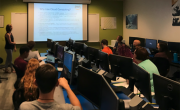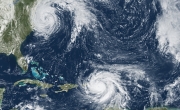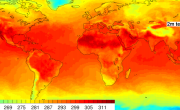Autumn 2020 | Ivette Hernández Baños
Visitors: Assessing the FV3-LAM Data Assimilation Capability to Represent Convection
Visitor: Ivette Hernández Baños
Community Connections: Introducing Undergraduate Students to NWP by Using Software Containers

Autumn 2020 | Jamie Wolff, the lead of the software containers and cloud computing task in the DTC, contacted me in the Spring of 2019 about a unique opportunity to collaborate on a course that would offer interested students at Metropolitan State University an opportunity to run and experiment with an end-to-end numerical weather prediction (NWP) system utilizing cloud computing. The motivation behind this collaboration was to introduce undergraduates of a bachelor’s degree Meteorology program to NWP in a stress-free environment in… Read More
Did you know?: Instructional Videos for MRW App v1.0 and CCPP
Autumn 2020 | The Developmental Testbed Center has developed a set of instructional training videos. Two videos are now available to familiarize the NWP development community with the UFS code and the Medium-Range Weather (MRW) App v1.0. UFS Code Repositories describes the overall structure of the Medium-Range Weather Application ("MRW App") source code repositories, directory structures, and where to find further documentation. Raw Initial Conditions for the UFS Medium-Range Weather Application v1.0 describes the formats of raw… Read More
Announcement: Unified Forecast System (UFS) Medium-Range Weather (MRW) Application Users' Training

2020-10-30 | The Developmental Testbed Center (DTC), in cooperation with Subject Matter Experts (SMEs) from NOAA's Environmental Modeling Center (EMC) and Geophysical Fluid Dynamics Laboratory (GFDL), as well as NCAR’s Climate and Global Dynamics (CGD) Laboratory, will be hosting a live, virtual training session for the Unified Forecast System (UFS) Medium-Range Weather (MRW) Application from November 4-6 and November 9, 2020 (see to the training webpage). This training will be focused on teaching community… Read More
Software Release: METplus 3.1 Coordinated Release

2020-08-11 | The enhanced Model Evaluation Tools (METplus) development team at the DTC is pleased to announce the release of the multi-component verification capability called METplus. It includes METplus version 3.1, MET version 9.1 and METviewer version 3.1. METplus contains a suite of Python wrappers and ancillary scripts to enhance the user's ability to quickly set-up and run MET. METviewer is a database and display system for aggregating and plotting MET output. Users can now check everything out and build through the… Read More
Lead Story: UFS Medium-Range Weather Application Launched
Team Depth and Broad Engagement = Success

Summer 2020 | The community aspect of NOAA’s Unified Forecast System (UFS) is off to a strong start with the release of the UFS Medium-Range Weather Application v1.0 on 11 March 2020. The planning and preparations for this release were truly a community effort that convened a multi-institutional team of scientists and software engineers from NOAA’s Environmental Modeling Center (EMC), NOAA research laboratories (Global Systems Laboratory [GSL], National Severe Storms Laboratory [NSSL], Physical… Read More
Director's Corner: Community Modeling and the Transition from Research to Operations and Operations to Research
Jim Kinter

Summer 2020 | This is an exciting era in Earth system prediction research and operational forecasting. Researchers are gaining access to a powerful set of tools that are deployed or soon to be used to produce the nation’s weather forecasts, climate outlooks, and more. Operational forecasters are gaining more direct access to the latest breakthroughs and innovations in modeling and prediction research. Here’s why I am so enthusiastic. … Read More
Who's Who: Lindsay Blank
Summer 2020 | Lindsay Blank joined the DTC as an Associate Scientist in January 2018; this is her first career position in the field after completing school. She grew up in the D.C. area of Maryland, and earned her B.S. in Meteorology and B.S. in Computer Science at Millersville University in Millersville, Pennsylvania. Her Computer Science degree was added in her junior year of college after interning at the National Severe Storms Lab in Norman, Oklahoma where she was introduced to numerical… Read More
Bridges to Operations: CCPP Framework

Summer 2020 | The Common Community Physics Package (CCPP) is a library of physical parameterizations distributed with a framework that enables its use in any host model that incorporates CCPP into their own structure. CCPP is currently used with NOAA’s Unified Forecast System (UFS) for experimental subseasonal-to-seasonal, medium- and short-range weather, air quality, and hurricane applications, with all physics development for the UFS transitioned to CCPP. The CCPP framework was originally developed by DTC, and is now being co-… Read More
Visitors: The impacts of including aerosols in the radiance observation operator on analysis using GSI
Visitor: Shih-Wei Wei
Summer 2020 | Background The Gridpoint Statistical Interpolation (GSI) is a variational data assimilation system (DAS) used by several operational centers. GSI is used by NASA’s Goddard Earth Observing System Model, Version 5 (GEOS-5), as well as NOAA’s Global Forecast… Read More
Did you know?: Community Workflow for the Limited Area Model Version of the FV3
Summer 2020 | A workflow enabling users to run the atmospheric component of the Unified Forecast System regional configuration (FV3-LAM) in an end-to-end capacity will soon be available to the broader community. This community workflow is the result of a coordinated effort between EMC, GSL, and DTC. Components of the workflow include experiment generation, Rocoto XML file generation, and the scripts necessary to run pre-processing, model integration, and post- processing. Collaboration across multiple labs fostered the development of… Read More
Lead Story: In Memoriam: Bill Lapenta

Spring 2020 | The DTC community mourns the passing of William “Bill” Lapenta, Ph.D. Bill was the Acting Director of NOAA’s Office of Weather and Air Quality (OWAQ) within NOAA’s Oceanic and Atmospheric Research that supports world-class weather and air quality research. He was also the guiding force and energy behind the Earth Prediction Innovation Center (EPIC) with the goal to launch the U.S. forward as the world leader in numerical weather prediction through public-academic-private partnerships. He was committed to conquering the… Read More
Director's Corner: A Look Ahead
Dorothy Koch

Spring 2020 | At the National Weather Service’s Office of Science and Technology Integration (OSTI), we’re currently planning milestones for the coming year with our partners. OSTI manages a broad portfolio of research and development efforts designed to improve operational forecast capabilities, and our partners in these efforts are in both the research and operational communities. We aim to understand forecaster priorities, and to communicate operational requirements so that community members can come up with innovative solutions… Read More
Who's Who: LinLin Pan
NOAA
Spring 2020 | LinLin was born into a family of farmers in Southeast China where the weather is dominated by the Asian Monsoon. “I can’t remember how many times my parents sighed gravely in front of the ruined crops because of the wrong prediction of Mei-yu – endless rainy days during the summer. My family would starve in this case.” LinLin was determined to study weather to help farmers, and now he works to make sure severe weather events are forecasted accurately. Diligent and determined, Linlin was accepted into the Department of… Read More
Pagination
Copyright © 2026. All rights reserved.
